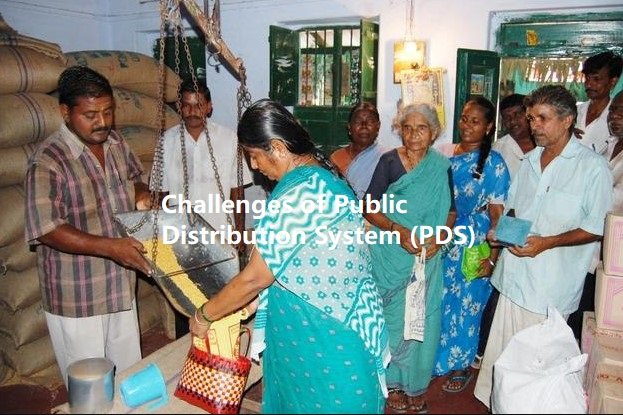Economics, Government Policies, GS P6 (Economy, Geography, Environment...), UPSC
Q. What are the major challenges of Public Distribution System (PDS) in India? How can it be made effective and transparent? [UPSC 2022 GS P-3]
Public Distribution System (PDS) is a government-run food security system in India. It aims to make essential food grains available to a significant part of the population at subsidized prices. PDS involves a network of fair price shops where beneficiaries can purchase commodities like wheat, rice, and sugar at below-market rates. The system is primarily targeted at low-income households and vulnerable groups to ensure food security and nutritional support.
Challenges of Public Distribution System (PDS) in India
The Public Distribution System (PDS) in India, while a crucial safety net, faces several challenges:
- Leakages and Diversion: A significant portion of subsidized food grains is diverted from intended beneficiaries to the open market due to corruption and inefficiencies.
- Inaccurate Targeting: Identifying and targeting the actual beneficiaries is a complex task. Often, ineligible beneficiaries receive benefits while eligible ones are excluded.
- Infrastructure Issues: Lack of proper storage facilities, transportation networks, and fair price shops leads to spoilage, delays, and uneven distribution.
- Low Quality of Food Grains: The quality of food grains distributed is often subpar, affecting the nutritional value for beneficiaries.
- Political Interference: Political interference in the system often hinders effective implementation and leads to corruption.
- Limited Product Range: PDS primarily focuses on staple foods, neglecting nutritional diversity.
Making PDS Effective and Transparent
To overcome these challenges and improve the effectiveness and transparency of PDS, several measures can be implemented:
- Digitization: Implementing technology-based solutions like biometric authentication, point-of-sale machines, and real-time monitoring can reduce leakages and improve transparency. Here’s a deeper look:
- Aadhaar Linking: Linking PDS with Aadhaar has been a significant step. It reduces ghost beneficiaries and ensures that subsidies reach the intended recipients.
- Point of Sale (PoS) Machines: Mandatory use of PoS machines in fair price shops can track transactions in real-time, preventing diversion of food grains.
- Real-time Monitoring: Using technology to monitor stock levels, distribution patterns, and beneficiary data allows for early detection of irregularities.
- Mobile Applications: Developing mobile apps for beneficiaries can provide information about entitlements, fair price shop locations, and complaint redressal mechanisms.
- Beneficiary Identification: Strengthening the process of identifying eligible beneficiaries through robust surveys and databases can ensure accurate targeting.
- Socio-economic Censuses: Regular and comprehensive socio-economic surveys can help identify the poor and vulnerable population.
- Geographic Targeting: Using geographic information systems (GIS) to identify poverty hotspots can improve targeting efficiency.
- Proxy Means Tests: Developing proxy indicators like housing, ownership of assets, and occupation can help in initial screening of beneficiaries.
- Dynamic Targeting: Regularly updating beneficiary databases to account for changes in income and living conditions is essential.
- Infrastructure Development: Investing in storage facilities, transportation networks, and fair price shops can enhance the efficiency of the system.
- Quality Control: Implementing strict quality control measures and regular inspections can improve the nutritional value of food grains.
- Accountability and Transparency: Encouraging public participation, conducting regular audits, and implementing strict accountability measures can reduce corruption.
- Diversification of Products: Expanding the range of products beyond staple foods to include nutritious items can improve the overall nutritional value of the PDS.
- Public-Private Partnerships: Collaborating with the private sector for efficient logistics, storage, and distribution can enhance the system’s efficiency.
By addressing these challenges and implementing comprehensive reforms, the PDS can become a more effective tool for ensuring food security and improving the lives of millions of Indians.


